Leadership Development Report: Saudi Healthcare and Vision 2030
VerifiedAdded on 2022/12/08
|6
|901
|177
Report
AI Summary
This report examines leadership development within the framework of Saudi Arabia's Vision 2030, focusing on the healthcare sector's transformation. It analyzes two articles: the first discusses the introduction of interprofessional education (IPE) in Saudi health science curricula to improve patient outcomes and reduce medical errors, aligning with the Vision 2030 goals of enhanced public services. The second article highlights the importance of improving pharmaceutical quality and patient safety to achieve the Vision 2030 objectives, emphasizing the need for quality medicines, robust regulations, and effective pharmacovigilance. The report underscores the interconnectedness of leadership, education, pharmaceutical standards, and healthcare quality in realizing Saudi Arabia's ambitious vision for the future. The report also highlights the importance of teamwork and collaboration among healthcare providers to reduce medical errors and improve the healthcare sector.
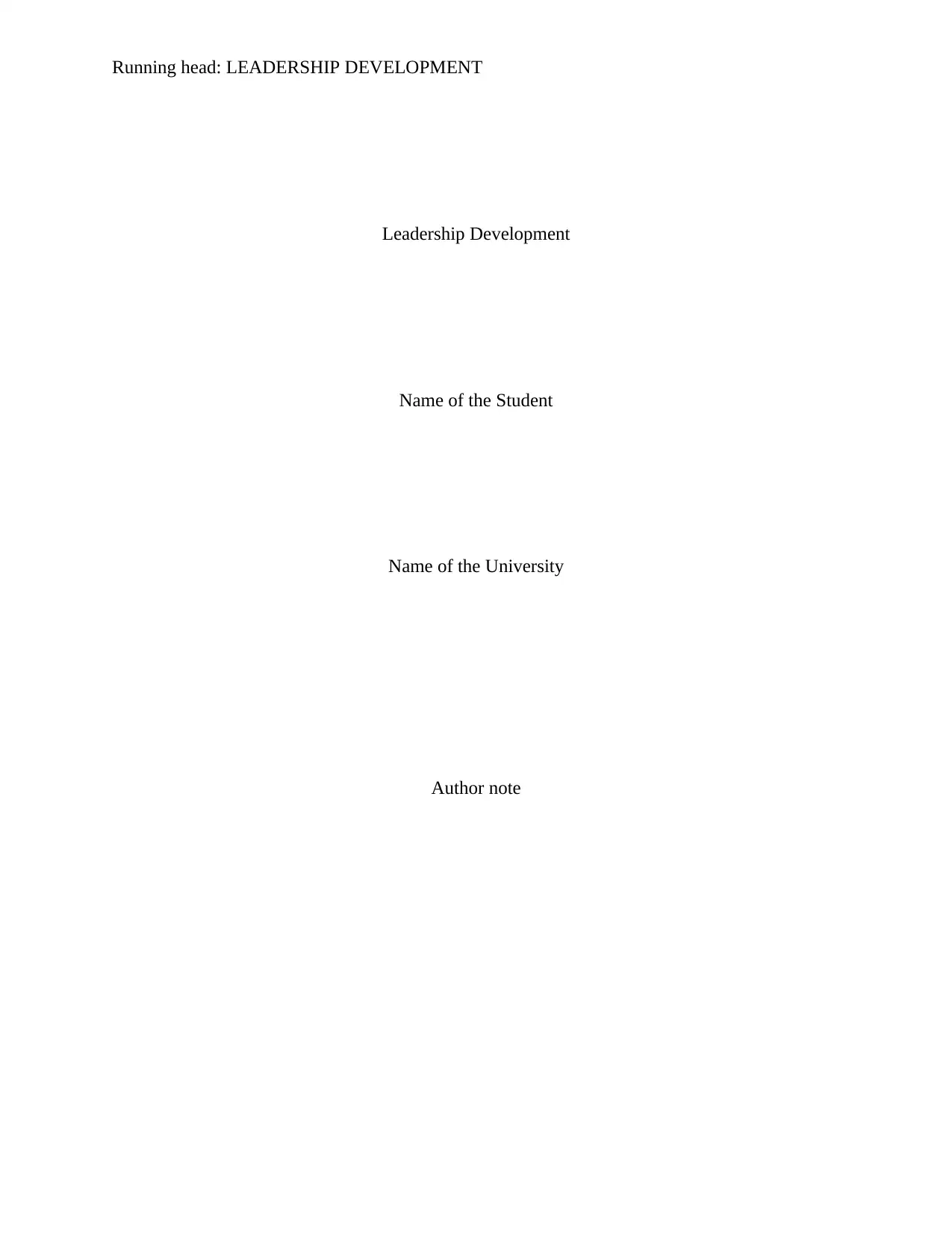
Running head: LEADERSHIP DEVELOPMENT
Leadership Development
Name of the Student
Name of the University
Author note
Leadership Development
Name of the Student
Name of the University
Author note
Paraphrase This Document
Need a fresh take? Get an instant paraphrase of this document with our AI Paraphraser
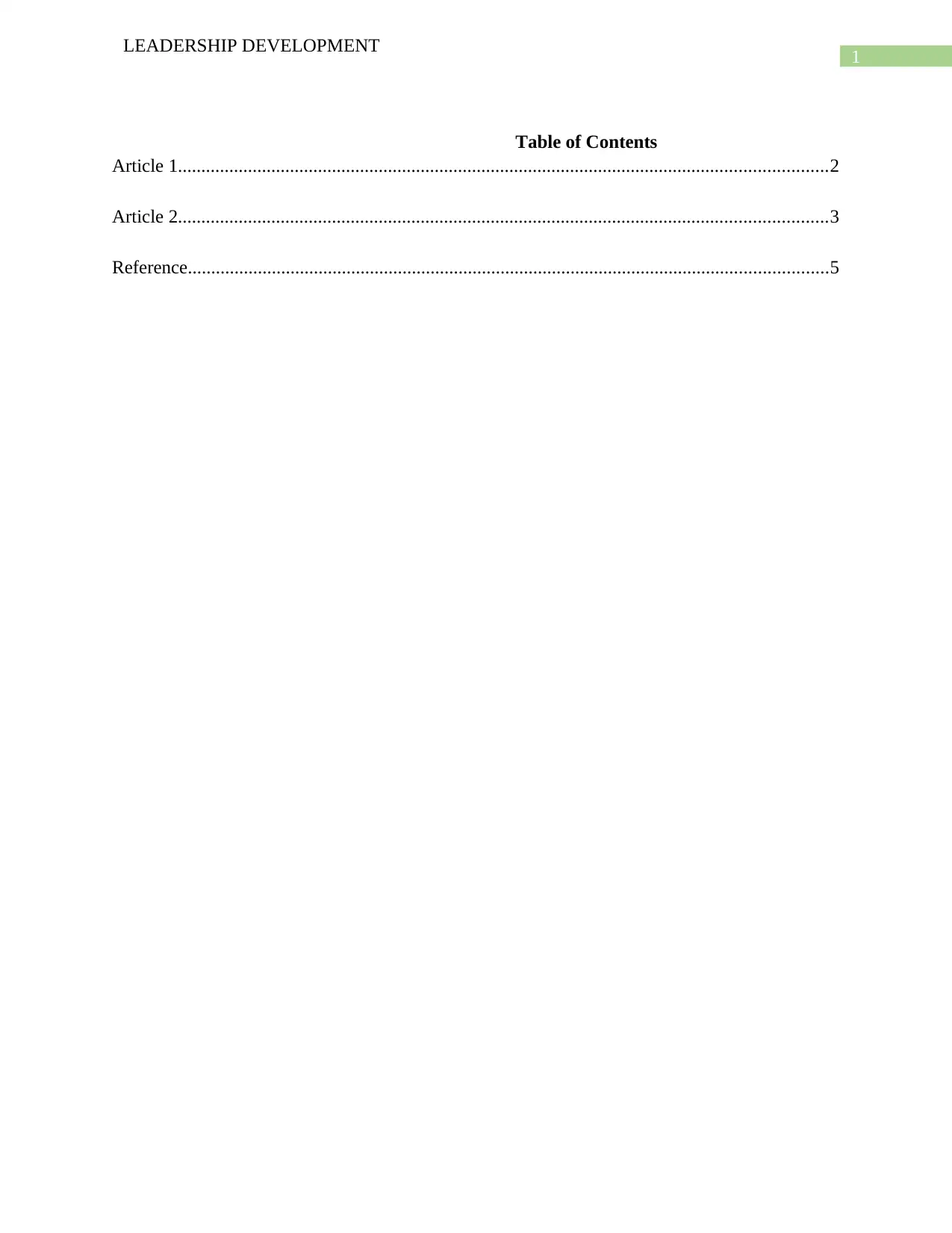
1
LEADERSHIP DEVELOPMENT
Table of Contents
Article 1...........................................................................................................................................2
Article 2...........................................................................................................................................3
Reference.........................................................................................................................................5
LEADERSHIP DEVELOPMENT
Table of Contents
Article 1...........................................................................................................................................2
Article 2...........................................................................................................................................3
Reference.........................................................................................................................................5
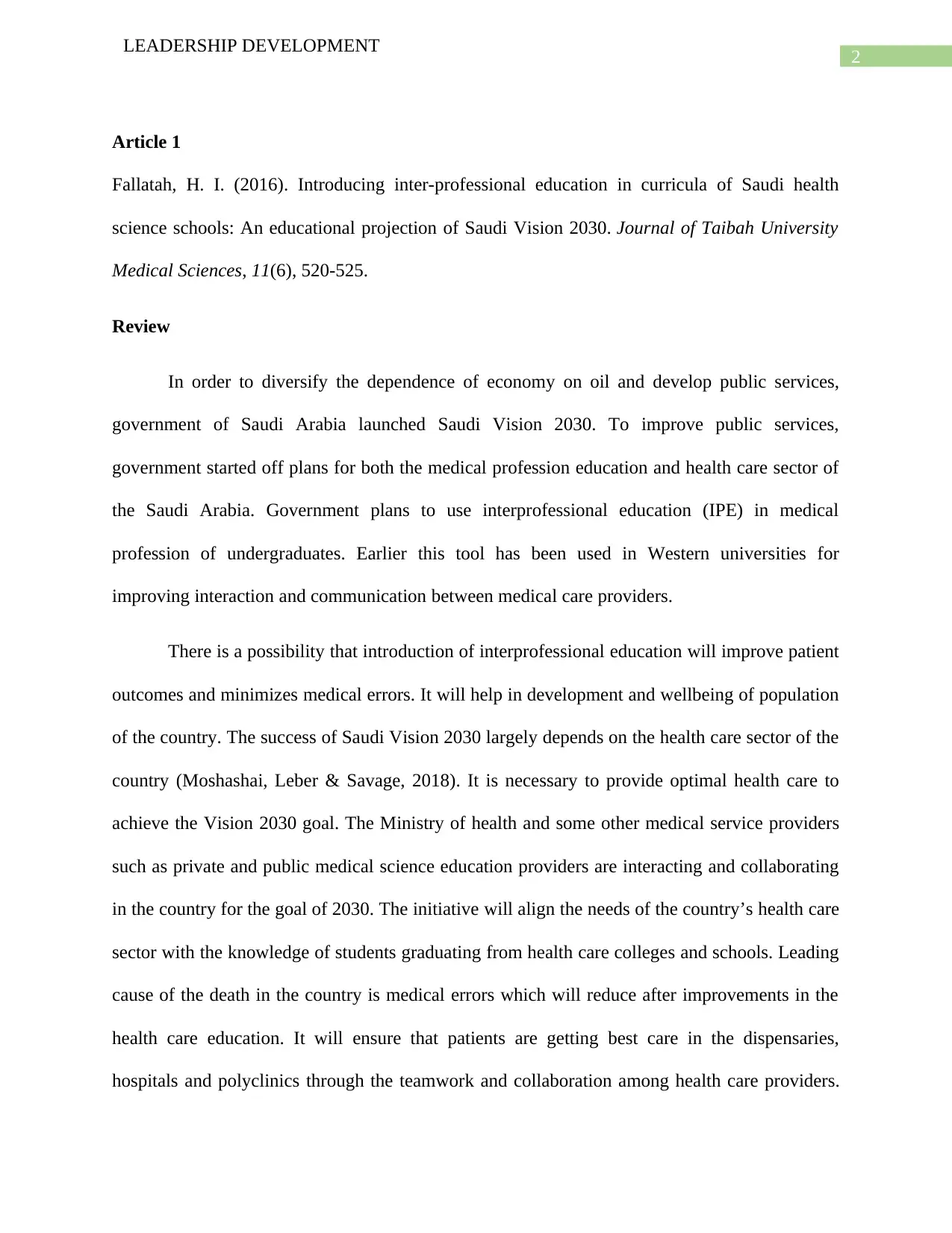
2
LEADERSHIP DEVELOPMENT
Article 1
Fallatah, H. I. (2016). Introducing inter-professional education in curricula of Saudi health
science schools: An educational projection of Saudi Vision 2030. Journal of Taibah University
Medical Sciences, 11(6), 520-525.
Review
In order to diversify the dependence of economy on oil and develop public services,
government of Saudi Arabia launched Saudi Vision 2030. To improve public services,
government started off plans for both the medical profession education and health care sector of
the Saudi Arabia. Government plans to use interprofessional education (IPE) in medical
profession of undergraduates. Earlier this tool has been used in Western universities for
improving interaction and communication between medical care providers.
There is a possibility that introduction of interprofessional education will improve patient
outcomes and minimizes medical errors. It will help in development and wellbeing of population
of the country. The success of Saudi Vision 2030 largely depends on the health care sector of the
country (Moshashai, Leber & Savage, 2018). It is necessary to provide optimal health care to
achieve the Vision 2030 goal. The Ministry of health and some other medical service providers
such as private and public medical science education providers are interacting and collaborating
in the country for the goal of 2030. The initiative will align the needs of the country’s health care
sector with the knowledge of students graduating from health care colleges and schools. Leading
cause of the death in the country is medical errors which will reduce after improvements in the
health care education. It will ensure that patients are getting best care in the dispensaries,
hospitals and polyclinics through the teamwork and collaboration among health care providers.
LEADERSHIP DEVELOPMENT
Article 1
Fallatah, H. I. (2016). Introducing inter-professional education in curricula of Saudi health
science schools: An educational projection of Saudi Vision 2030. Journal of Taibah University
Medical Sciences, 11(6), 520-525.
Review
In order to diversify the dependence of economy on oil and develop public services,
government of Saudi Arabia launched Saudi Vision 2030. To improve public services,
government started off plans for both the medical profession education and health care sector of
the Saudi Arabia. Government plans to use interprofessional education (IPE) in medical
profession of undergraduates. Earlier this tool has been used in Western universities for
improving interaction and communication between medical care providers.
There is a possibility that introduction of interprofessional education will improve patient
outcomes and minimizes medical errors. It will help in development and wellbeing of population
of the country. The success of Saudi Vision 2030 largely depends on the health care sector of the
country (Moshashai, Leber & Savage, 2018). It is necessary to provide optimal health care to
achieve the Vision 2030 goal. The Ministry of health and some other medical service providers
such as private and public medical science education providers are interacting and collaborating
in the country for the goal of 2030. The initiative will align the needs of the country’s health care
sector with the knowledge of students graduating from health care colleges and schools. Leading
cause of the death in the country is medical errors which will reduce after improvements in the
health care education. It will ensure that patients are getting best care in the dispensaries,
hospitals and polyclinics through the teamwork and collaboration among health care providers.
⊘ This is a preview!⊘
Do you want full access?
Subscribe today to unlock all pages.

Trusted by 1+ million students worldwide
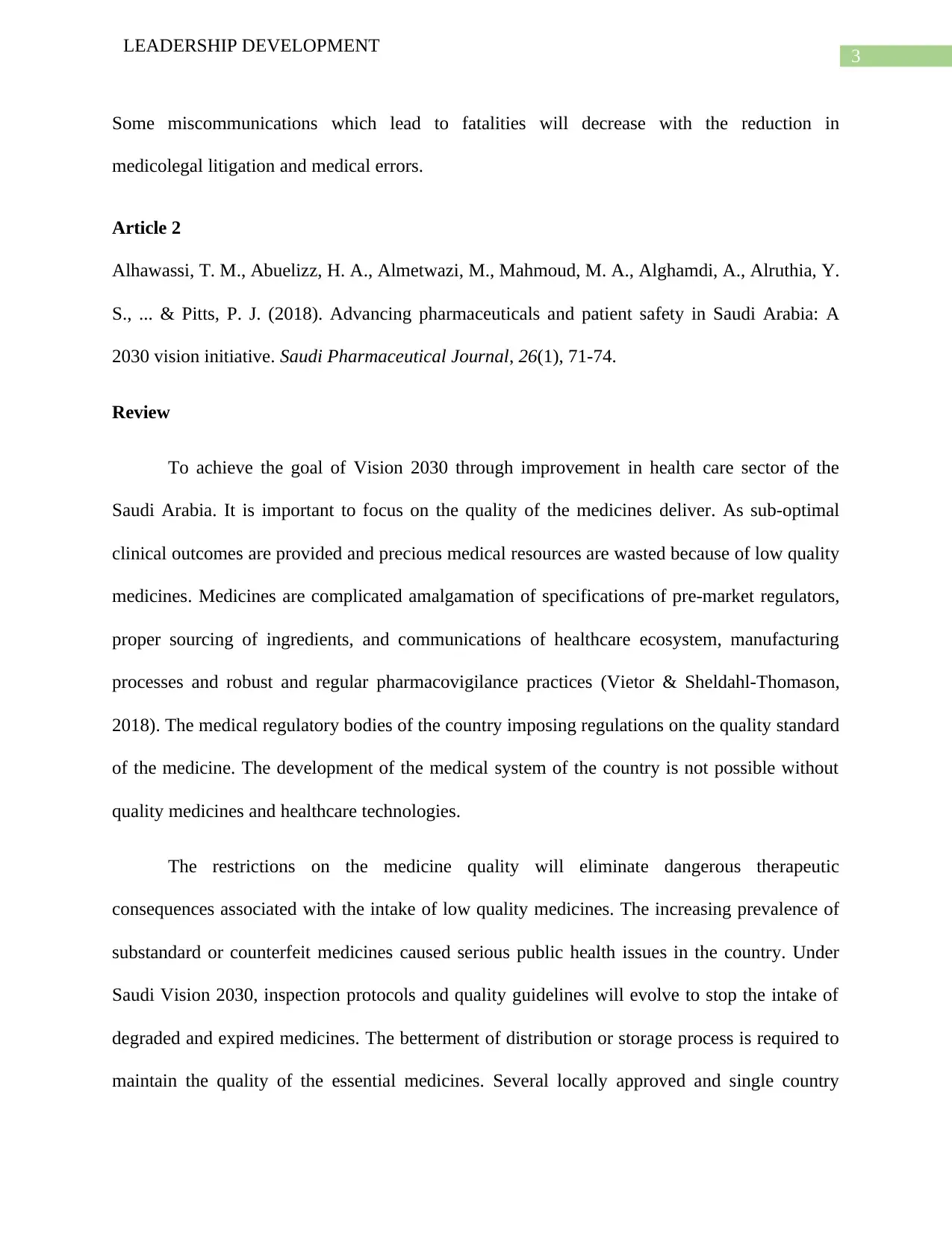
3
LEADERSHIP DEVELOPMENT
Some miscommunications which lead to fatalities will decrease with the reduction in
medicolegal litigation and medical errors.
Article 2
Alhawassi, T. M., Abuelizz, H. A., Almetwazi, M., Mahmoud, M. A., Alghamdi, A., Alruthia, Y.
S., ... & Pitts, P. J. (2018). Advancing pharmaceuticals and patient safety in Saudi Arabia: A
2030 vision initiative. Saudi Pharmaceutical Journal, 26(1), 71-74.
Review
To achieve the goal of Vision 2030 through improvement in health care sector of the
Saudi Arabia. It is important to focus on the quality of the medicines deliver. As sub-optimal
clinical outcomes are provided and precious medical resources are wasted because of low quality
medicines. Medicines are complicated amalgamation of specifications of pre-market regulators,
proper sourcing of ingredients, and communications of healthcare ecosystem, manufacturing
processes and robust and regular pharmacovigilance practices (Vietor & Sheldahl-Thomason,
2018). The medical regulatory bodies of the country imposing regulations on the quality standard
of the medicine. The development of the medical system of the country is not possible without
quality medicines and healthcare technologies.
The restrictions on the medicine quality will eliminate dangerous therapeutic
consequences associated with the intake of low quality medicines. The increasing prevalence of
substandard or counterfeit medicines caused serious public health issues in the country. Under
Saudi Vision 2030, inspection protocols and quality guidelines will evolve to stop the intake of
degraded and expired medicines. The betterment of distribution or storage process is required to
maintain the quality of the essential medicines. Several locally approved and single country
LEADERSHIP DEVELOPMENT
Some miscommunications which lead to fatalities will decrease with the reduction in
medicolegal litigation and medical errors.
Article 2
Alhawassi, T. M., Abuelizz, H. A., Almetwazi, M., Mahmoud, M. A., Alghamdi, A., Alruthia, Y.
S., ... & Pitts, P. J. (2018). Advancing pharmaceuticals and patient safety in Saudi Arabia: A
2030 vision initiative. Saudi Pharmaceutical Journal, 26(1), 71-74.
Review
To achieve the goal of Vision 2030 through improvement in health care sector of the
Saudi Arabia. It is important to focus on the quality of the medicines deliver. As sub-optimal
clinical outcomes are provided and precious medical resources are wasted because of low quality
medicines. Medicines are complicated amalgamation of specifications of pre-market regulators,
proper sourcing of ingredients, and communications of healthcare ecosystem, manufacturing
processes and robust and regular pharmacovigilance practices (Vietor & Sheldahl-Thomason,
2018). The medical regulatory bodies of the country imposing regulations on the quality standard
of the medicine. The development of the medical system of the country is not possible without
quality medicines and healthcare technologies.
The restrictions on the medicine quality will eliminate dangerous therapeutic
consequences associated with the intake of low quality medicines. The increasing prevalence of
substandard or counterfeit medicines caused serious public health issues in the country. Under
Saudi Vision 2030, inspection protocols and quality guidelines will evolve to stop the intake of
degraded and expired medicines. The betterment of distribution or storage process is required to
maintain the quality of the essential medicines. Several locally approved and single country
Paraphrase This Document
Need a fresh take? Get an instant paraphrase of this document with our AI Paraphraser
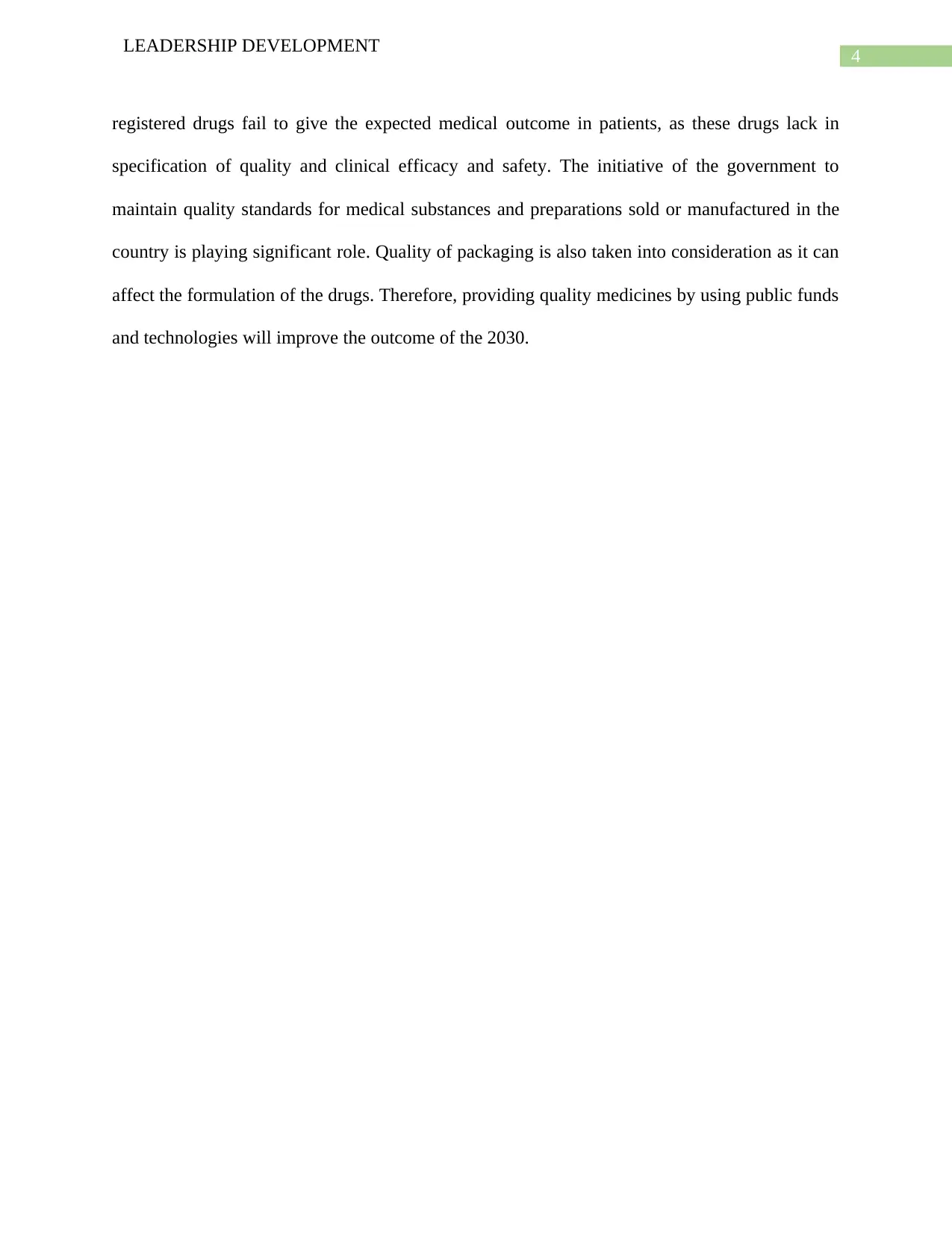
4
LEADERSHIP DEVELOPMENT
registered drugs fail to give the expected medical outcome in patients, as these drugs lack in
specification of quality and clinical efficacy and safety. The initiative of the government to
maintain quality standards for medical substances and preparations sold or manufactured in the
country is playing significant role. Quality of packaging is also taken into consideration as it can
affect the formulation of the drugs. Therefore, providing quality medicines by using public funds
and technologies will improve the outcome of the 2030.
LEADERSHIP DEVELOPMENT
registered drugs fail to give the expected medical outcome in patients, as these drugs lack in
specification of quality and clinical efficacy and safety. The initiative of the government to
maintain quality standards for medical substances and preparations sold or manufactured in the
country is playing significant role. Quality of packaging is also taken into consideration as it can
affect the formulation of the drugs. Therefore, providing quality medicines by using public funds
and technologies will improve the outcome of the 2030.
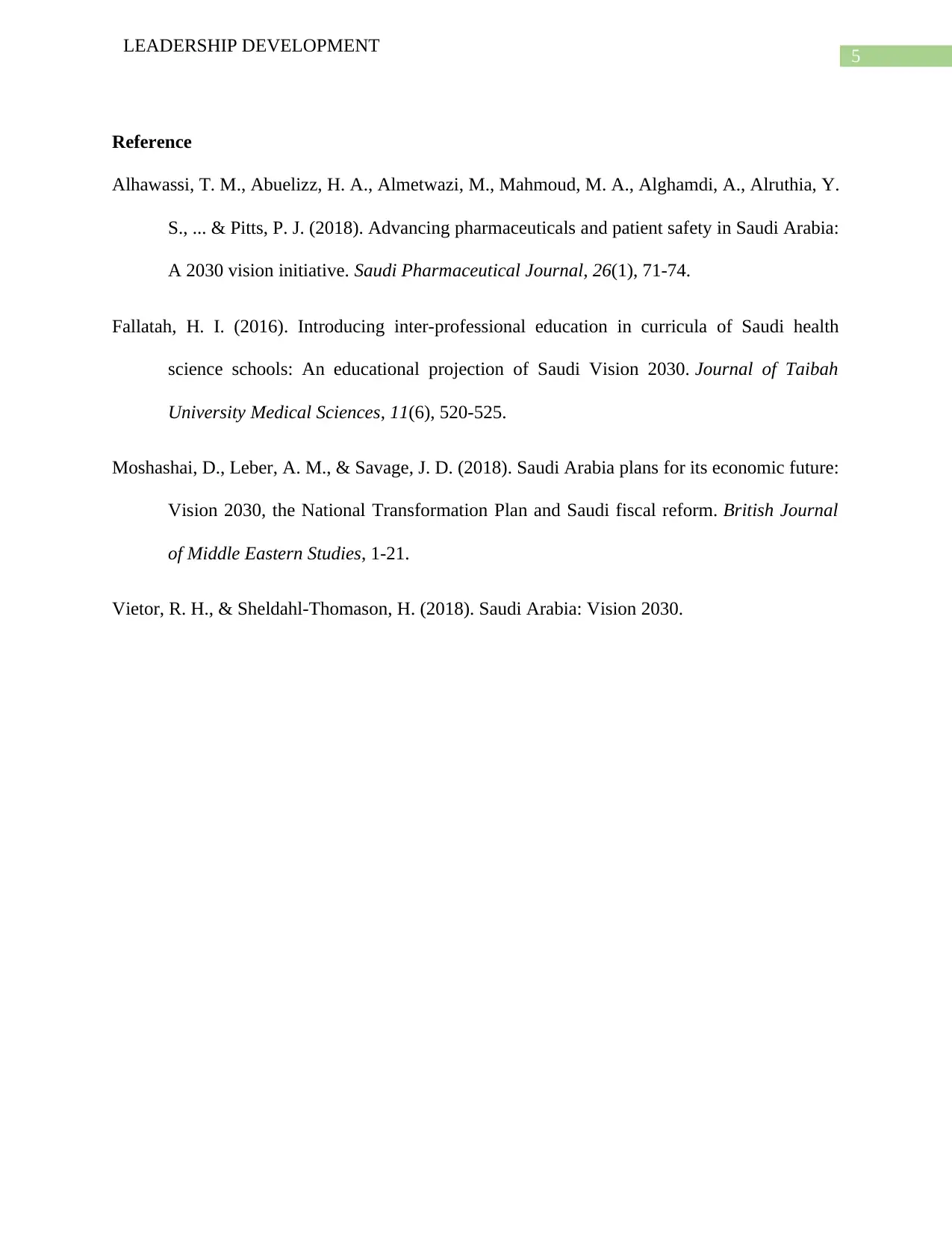
5
LEADERSHIP DEVELOPMENT
Reference
Alhawassi, T. M., Abuelizz, H. A., Almetwazi, M., Mahmoud, M. A., Alghamdi, A., Alruthia, Y.
S., ... & Pitts, P. J. (2018). Advancing pharmaceuticals and patient safety in Saudi Arabia:
A 2030 vision initiative. Saudi Pharmaceutical Journal, 26(1), 71-74.
Fallatah, H. I. (2016). Introducing inter-professional education in curricula of Saudi health
science schools: An educational projection of Saudi Vision 2030. Journal of Taibah
University Medical Sciences, 11(6), 520-525.
Moshashai, D., Leber, A. M., & Savage, J. D. (2018). Saudi Arabia plans for its economic future:
Vision 2030, the National Transformation Plan and Saudi fiscal reform. British Journal
of Middle Eastern Studies, 1-21.
Vietor, R. H., & Sheldahl-Thomason, H. (2018). Saudi Arabia: Vision 2030.
LEADERSHIP DEVELOPMENT
Reference
Alhawassi, T. M., Abuelizz, H. A., Almetwazi, M., Mahmoud, M. A., Alghamdi, A., Alruthia, Y.
S., ... & Pitts, P. J. (2018). Advancing pharmaceuticals and patient safety in Saudi Arabia:
A 2030 vision initiative. Saudi Pharmaceutical Journal, 26(1), 71-74.
Fallatah, H. I. (2016). Introducing inter-professional education in curricula of Saudi health
science schools: An educational projection of Saudi Vision 2030. Journal of Taibah
University Medical Sciences, 11(6), 520-525.
Moshashai, D., Leber, A. M., & Savage, J. D. (2018). Saudi Arabia plans for its economic future:
Vision 2030, the National Transformation Plan and Saudi fiscal reform. British Journal
of Middle Eastern Studies, 1-21.
Vietor, R. H., & Sheldahl-Thomason, H. (2018). Saudi Arabia: Vision 2030.
⊘ This is a preview!⊘
Do you want full access?
Subscribe today to unlock all pages.

Trusted by 1+ million students worldwide
1 out of 6
Related Documents
Your All-in-One AI-Powered Toolkit for Academic Success.
+13062052269
info@desklib.com
Available 24*7 on WhatsApp / Email
![[object Object]](/_next/static/media/star-bottom.7253800d.svg)
Unlock your academic potential
Copyright © 2020–2025 A2Z Services. All Rights Reserved. Developed and managed by ZUCOL.





